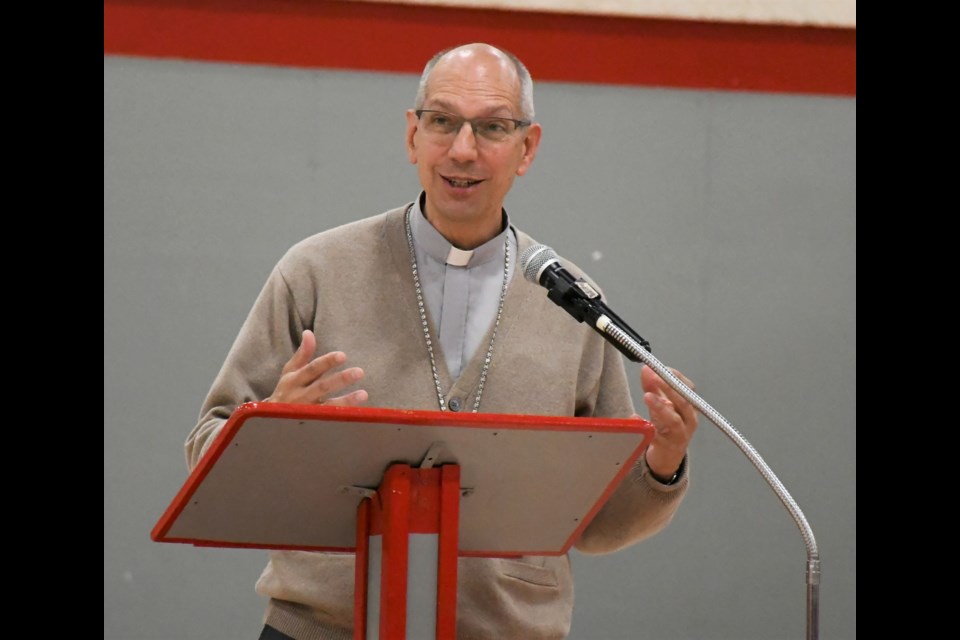Archbishop Don Bolen was emotionally moved after accompanying dozens of First Nations delegates and residential school survivors to Rome for a meeting with the Pope recently.
Bolen, 61, with the Roman Catholic Archdiocese of Regina, spoke to hundreds of elementary and high school students at Vanier Collegiate on June 2 about his March trip and the general topic of truth and reconciliation.
Trip highlights
During his presentation, one student asked what effect the trip had on him. In response, Bolen said travelling with the survivors, seeing their reaction to Pope Francis’ apology, and the transformation of their spirits were his favourite parts.
“(Survivor) Ted Quewezance, the day after he returned to Canada, gave an interview, and he said, ‘I’m bringing closure to this whole chapter in my life. This has helped me bring closure,’” Bolen recalled.
“That statement, that is what we’re trying to do. We’re trying to help people who have suffered from trauma and have left their descendants struggling with trauma, to bring some kind of closure and peace so they can move forward from that experience.
“The apology, the acknowledgement of the Church’s role and the sense there is a way forward was the biggest highlight,” he said.
Bolen’s other moment was how “receptive” Pope Francis appeared when the delegations spoke to him. He “listened very deeply” and “was profoundly moved by meeting with them.”
Meanwhile, when he spoke, he discussed how Aboriginal culture was disrupted when European explorers arrived, the abuse children faced at residential schools, and the wrongness of the schools.
“It was a moment of deep joy (when he apologized),” added Bolen.
Pope to Canada
The pope comes to Canada from July 24 to 30 and will visit several locations, while he will likely officially apologize for the Roman Catholic Church’s role with Indian residential schools.
When asked what effect the trip would have, Bolen replied that whenever a pope goes anywhere, there is usually “tumult” before the arrival. Furthermore, people usually ask why he is coming, how much the trip will cost and what difference the visit will make.
“I think I’ve seen it many times in those visits. Then the pope comes, and he speaks to the heart of issues. And … it does have a transformative effect,” he said, recalling a trip to the Holy Land by former pope Paul John II, which caused fury leading to his arrival but led to a brief shift in attitudes afterward.
“I think that we can expect that the papal visit — which is not welcomed by everybody … (and many) will say, ‘I don’t need it; I don’t want it,’ including many indigenous people — I think we can look at it as having the potential to move forward,” Bolen added.
Steps forward
There are four steps the Church and society can take to have better relations with Aboriginal people, steps that residential school survivors have suggested, said Bolen.
The first is the need to engage with survivors and listen to their stories, experiences and insights since they have ideas that could address intergenerational trauma and its long-term effects.
Furthermore, societal injustices need to be addressed, especially since First Nations people have high poverty rates, poor access to water, education and health, and face addictions, suicides, jail, family violence and racist attitudes.
Second, survivors want their stories to be heard and society to acknowledge how painful the schools were, while they want new ways to tell Aboriginal history in Canada. They want the Church to acknowledge its role and be honest about the struggles they face.
“Truth-telling lets us see in a more nuanced way, a better way of telling the story of residential schools,” said Bolen.
Third, Aboriginal people want their “inherent rights” respected, as laid out in a United Nations document that supports their existence.
Lastly, First Nations want society to have a new respect for their languages, which carry their culture, traditions and spiritual ways of doing things.
“Those four areas … are full of possibilities,” Bolen added.




